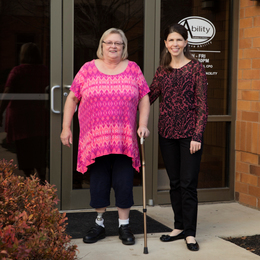
In April 2015, when an infection caused Bobbie DeHaven to have her right leg amputated below the knee, her life changed dramatically. Trips to the grocery store were suddenly a struggle, going to the shore exhausted her, and even gardening—her core passion—had become arduous. Her most difficult time was not having the mobility to keep up with her grandchildren.
After Bobbie learned she could receive a prosthesis, she was highly motivated to get back to her normal lifestyle. It wasn’t going to be an easy road, but she knew an effective prosthesis would help her begin to accomplish her short and long-term goals. When she met Taffy Bowman, Certified Prosthetist & Orthotist (CPO) and managing practitioner at Ability’s Exton patient care center, she was hopeful to begin this journey with Ability.
“I never thought I’d get a prosthesis because of my age and weight, but Taffy suggested it,” she says. “I had lots of questions, but Taffy never made me feel foolish. She explained everything really well, and made me feel comfortable asking questions.”
Since 2004, Ability Prosthetics and Orthotics has been committed to providing the best patient care to any child, adult or veteran with prosthetic and orthotic needs. Ability’s formally trained, American Board for Certification (ABC)-certified prosthetists and orthotists evaluate, design and fit patients with custom, as well as off-the-shelf, prosthetic and orthotic devices. Ability focuses on a comprehensive care philosophy that includes turning to more than 50 best-in-class manufacturers of innovative device types, styles and designs.
Ability manages the entire spectrum of a patient’s care at its 10 clinical facilities located throughout the mid-Atlantic and the Carolinas. The company also services patients in skilled nursing and acute rehab facilities, hospitals and in patients’ homes.
Learning to Adapt
Beginning with the initial consultation, Bowman focuses on the patient’s life: their world prior to their amputation; the status of their current living situation; and what they want to achieve in the future. She also works closely with the members of the patient’s family and other involved health care professionals to help set goals, objectives and measureable outcomes to ensure the design matches the patient’s functional requirements.
“Most of what we do is improving gait function, so we use materials such as hydraulics, which help simulate human body [movements] more than ever before,” says Bowman. “It’s wonderful to hear patients and spouses say, ‘Isn’t it just amazing what they can do?’”
The many rewarding aspects of Bowman’s profession include the fact that, as a clinician, she is called upon to be an engineer, an architect, a friend and an advisor. “It’s a very intimate process, working with someone and fitting the person,” she says. “We get to know them very well. The patient is a patient for life.”
At Ability, a team of supporters acknowledges the emotional stress, physical challenges and many questions associated with limb loss.
“You can’t sweep it under the rug,” Bowman says. “It is a normal part of the healing process. There is a bit of a mourning process and understanding it is difficult. But it’s OK what they’re feeling. We are there to make them as comfortable as possible.”
Gaining Independence
Bobbie used her temporary prosthesis for about seven months and quickly transitioned to her final prosthesis. One exciting part of this transition is that she evolved from a K2 foot to a K3 foot. K levels are based on an individual’s ability and potential to ambulate and navigate their environment and the K3 foot will offer her more range in motion.
“I had [the K3 foot] for a few days, to try it out, and found it really makes a difference,” she says. “I live in the country so I quickly realized that no ground is level, not even when it looks like it is or felt like it was. The K3 gave me much more balance. You don’t realize how ‘unlevel’ you are before you get it.”
For Bobbie, getting back to her outdoor hobbies is crucial, because being outside has always been “her thing.”
“Flowers, vegetable gardening—things like that I’ve really missed,” she says. “I haven’t been over to my daughter’s house because of steps. I couldn’t do steps without a prosthesis. I couldn’t see my grandchildren as often as I wanted to. And when I did, it was especially hard to keep up with the younger ones.”
Bobbie has faced a few obstacles, but her family has given her tremendous support throughout this journey.
“You don’t know how hard it is until you experience it,” she continues. “Even things they say are handicap accessible are still really hard to do, like shopping. My husband had to do it all. He had to get me to the car and in it. Then he had to take the wheelchair and put it in the car. Then we go to the store and he had to get the wheelchair out and unfold it, get me in it, then do the whole thing again afterwards. He never complained, but I know it was hard for him. Now he doesn’t have to do any of that!”
When she began her journey with Ability, Bobbie was hopeful. That hope has since turned to happiness. After all, she has not only returned to doing many of the things she enjoyed prior to the amputation but is also working toward accomplishing new goals.
“I would advise anyone to go for it,” she adds. “You never know what you’re capable of. I was unsure I could do it—the fittings, the therapy—but then I was surprised what I could accomplish.”
Ability Prosthetics and Orthotics Inc.
The Commons at Oaklands
660 W. Lincoln Highway, Exton
610-873-6733
www.abilitypo.com
Photograph by Jody Robinson


